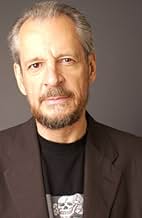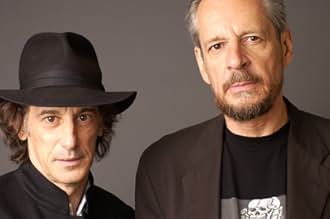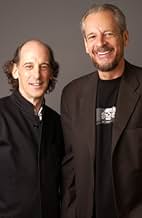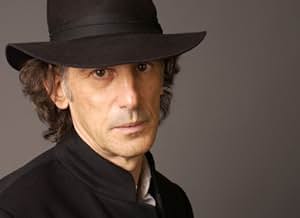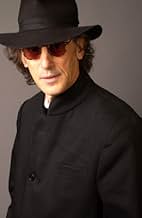- Prêmios
- 3 indicações no total
Zara McDowell
- Zoe
- (as Zara Mcdowell)
Wade Williams
- Claude's Father
- (as Wade Andrew Williams)
Julio Oscar Mechoso
- Peaches' Father
- (as Julio Oscar Mochoso)
Ashley Crisp
- Rebekah
- (as Ashley E. Crisp)
- Direção
- Roteiristas
- Elenco e equipe completos
- Produção, bilheteria e muito mais no IMDbPro
Avaliações em destaque
The Australian government had this film banned. So, that obviously meant that this obscure film that I had never heard of was worth seeing. Thanks to them and the acclaim of Australian film critics (notably Margaret Pomeranz), I - and I assume many others - sought out this film so we could watch it for ourselves.
Whilst the film is certainly not perfect, and is in many ways superficial in it's treatment of the numerous relationships presented (at 90min, they could have easily added another half hour to expand on these), I am glad that films like this exist, if only because they offer an escape from the increasingly similar plots and content of the majority of modern cinema.
Whilst the film is certainly not perfect, and is in many ways superficial in it's treatment of the numerous relationships presented (at 90min, they could have easily added another half hour to expand on these), I am glad that films like this exist, if only because they offer an escape from the increasingly similar plots and content of the majority of modern cinema.
ken park or krap nek as they say is basically four episodes with each episode dealing with an individual's family situation or lack thereof. These episodes are inter-cut within each other.
Though Larry's Clark's movies deal with very explicit, or "realistic" subject matter his presentation is overwrought. Characters are more caricatures than 'real' people. The zealot father, the aging housewife, the weird kid, the father with unrequited love. The scenes with these characters were hard for me to take in. The actions and reactions they take seemed so hackneyed to me. Could it be that Larry Clark is developing a "larry clarkness"? a style? As one who is purported to be a breaker of styles and conventions this movie was shot pretty conventionally with lots of sex. I wasn't too impressed with this effort. Some shots, as Larry Clark says, are there for realistic purposes but I just found it to be sensationalistic and unnecessary.
The cinematography was great that is probably due to the Ed Lachman. The blue and red tinge really added to their respective scenes. Probably use of tungsten for outdoors and daylight inside.
Correct me if I'm wrong but I could swear Larry Clark is moving from realism to symbolism. In one scene he has the family gather together on the front steps. Your good Ole' American suburban family, full of deceit and infidelity but putting up a great face none the less. It seemed like a tableau.
Though Larry's Clark's movies deal with very explicit, or "realistic" subject matter his presentation is overwrought. Characters are more caricatures than 'real' people. The zealot father, the aging housewife, the weird kid, the father with unrequited love. The scenes with these characters were hard for me to take in. The actions and reactions they take seemed so hackneyed to me. Could it be that Larry Clark is developing a "larry clarkness"? a style? As one who is purported to be a breaker of styles and conventions this movie was shot pretty conventionally with lots of sex. I wasn't too impressed with this effort. Some shots, as Larry Clark says, are there for realistic purposes but I just found it to be sensationalistic and unnecessary.
The cinematography was great that is probably due to the Ed Lachman. The blue and red tinge really added to their respective scenes. Probably use of tungsten for outdoors and daylight inside.
Correct me if I'm wrong but I could swear Larry Clark is moving from realism to symbolism. In one scene he has the family gather together on the front steps. Your good Ole' American suburban family, full of deceit and infidelity but putting up a great face none the less. It seemed like a tableau.
Reading the local (Belgian) reviews for this movie, you'd seriously think we're moving back in time. Critics seem to be bending over backwards in their defense of sexually explicit imagery (okay, there's a little bit of what could be considered hardcore footage here, but nothing on the level of, say, BAISE-MOI for instance), once again trying to establish the thin line between art and pornography, forgetting (conveniently, perhaps ?) to really focus on the film instead. Could it be that Harmony Korine's razor sharp screenplay, largely based on the personal experiences of some of director Larry Clark's friends and models, actually hit too close to home for a lot of people to admit ?
Though the sleepy suburb in this movie might qualify as quintessential Americana by definition of many, I can assure you that the stuff that happens over there takes place all over the world. A lot of things both the adolescents and their parents go through were instantly recognizable to me personally, and I'm a 35 (going on 36) year old employee from that minuscule ant heap of a country called Belgium. How's that for universal appeal ?
Too many adult viewers would still seem to prefer to deny the very possibility that their teen-aged children harbor strong sexual desires, let alone the likely consequence that they've already acted upon them ! It may strike some as slightly unsavory that now 59 year old Larry Clark addresses such issues (especially given the level of unflinching honesty and carnal frankness demonstrated here), as he did in both KIDS and BULLY previously, but nearly no one else apparently dares to come anywhere near this topic as of yet. Much more than simply courting controversy, Clark (and co-helmer Lachman) have crafted a beautiful, funny, touching, heartbreaking and absolutely haunting (those final frames with the titular Ken Park will be etched in my mind for life) work of, yes, art.
A lot of older viewers have remarked that the film is somehow unfairly slanted in favor of the young characters (compelling actors the lot of them), rendering the adults as grotesque caricatures. As far as I'm concerned, only very inattentive viewers could ever come up with that assessment. Tate's grandparents may initially come across as whiny and pathetic yet there's a sweet little scene later on that shows their genuine affection for one another. It is both telling and sad that their grisly fate apparently elicits far less shocks from its audiences than those scant minutes of groin action. A world gone mad, indeed.
Claude's macho dad is another case in point. His ultimate transgression towards his son manages to be both disturbing and weirdly touching. Each adult character (let's not forget Claude's mom, engagingly portrayed by the underrated Amanda Plummer) gets at least one scene where the admittedly stereotypical surface is scratched away and subtleties like a single wounded glance can turn the whole story on its head. I sincerely love this movie precisely for doing just that.
Though the sleepy suburb in this movie might qualify as quintessential Americana by definition of many, I can assure you that the stuff that happens over there takes place all over the world. A lot of things both the adolescents and their parents go through were instantly recognizable to me personally, and I'm a 35 (going on 36) year old employee from that minuscule ant heap of a country called Belgium. How's that for universal appeal ?
Too many adult viewers would still seem to prefer to deny the very possibility that their teen-aged children harbor strong sexual desires, let alone the likely consequence that they've already acted upon them ! It may strike some as slightly unsavory that now 59 year old Larry Clark addresses such issues (especially given the level of unflinching honesty and carnal frankness demonstrated here), as he did in both KIDS and BULLY previously, but nearly no one else apparently dares to come anywhere near this topic as of yet. Much more than simply courting controversy, Clark (and co-helmer Lachman) have crafted a beautiful, funny, touching, heartbreaking and absolutely haunting (those final frames with the titular Ken Park will be etched in my mind for life) work of, yes, art.
A lot of older viewers have remarked that the film is somehow unfairly slanted in favor of the young characters (compelling actors the lot of them), rendering the adults as grotesque caricatures. As far as I'm concerned, only very inattentive viewers could ever come up with that assessment. Tate's grandparents may initially come across as whiny and pathetic yet there's a sweet little scene later on that shows their genuine affection for one another. It is both telling and sad that their grisly fate apparently elicits far less shocks from its audiences than those scant minutes of groin action. A world gone mad, indeed.
Claude's macho dad is another case in point. His ultimate transgression towards his son manages to be both disturbing and weirdly touching. Each adult character (let's not forget Claude's mom, engagingly portrayed by the underrated Amanda Plummer) gets at least one scene where the admittedly stereotypical surface is scratched away and subtleties like a single wounded glance can turn the whole story on its head. I sincerely love this movie precisely for doing just that.
10peedur
Anyone who finds pornography disturbing will find "Ken Park" disturbing for both the wrong and the right reasons.
Its not pornography, but it will be confused with it easily since it contains many of the same powerful ingredients: nudity and explicit sexual behavior. What separates it from pornography is that "Ken Park"'s intent is not to arouse but to provoke an emotional response by placing these same powerful ingredients within a troublesome relational context. Unfortunately that's also the problem with "Ken Park".
An average viewer can't witness explicit sexual behavior and be unaffected by it. We are all sexual (mostly) and (most of us) respond to visual stimuli. "Ken Park" demands that the viewer suspend that response, look beyond any arousal or outrage generated from the explicit sexuality and focus on the relationships in the film (of which sex is merely the expression). This asks of the average cinema viewer much more sexual maturity than most films ever hope to ask.
We may demand more pressure on the envelope as a viewing public, but the cumulative effect of pushing the envelope is still in the realm of speculative sociolology. Also, the extreme youthful appearance some of the characters in the film will cause some companies to avoid distribution risks. Free speech is one thing; defending accusations of spreading pedophilia is quite another, and few companies can afford that kind of publicity.
Personally, I think that the Clark and Lachman have made a great film; its a moral and compassionate statement. The characters feel very real; in their banality there is real pathos. In fact, the bland dialogue and delivery explains why sex holds such a powerful lure for these kids. They have access to rare delight and comfort with sex and, weirdly enough, a sense of peace. It rings true. The tragedy plays out that they are all compromised by clueless or pathological parent figures and the sexuality reflects a history of thwarted attachment. The final scene with the three main characters together struck me as very bittersweet since it plays more as a fantasy than a likely scenario.
Art enjoys such a complex, troubled relationship with the American public. We are such a rapidly changing audience with a huge appetite for challenge, yet we don't necessarily absorb the changes we witness. As an audience, we expect far more cultural sophistication than our capacity for balanced interpretation. "Ken Park" is evidence of that.
Its not pornography, but it will be confused with it easily since it contains many of the same powerful ingredients: nudity and explicit sexual behavior. What separates it from pornography is that "Ken Park"'s intent is not to arouse but to provoke an emotional response by placing these same powerful ingredients within a troublesome relational context. Unfortunately that's also the problem with "Ken Park".
An average viewer can't witness explicit sexual behavior and be unaffected by it. We are all sexual (mostly) and (most of us) respond to visual stimuli. "Ken Park" demands that the viewer suspend that response, look beyond any arousal or outrage generated from the explicit sexuality and focus on the relationships in the film (of which sex is merely the expression). This asks of the average cinema viewer much more sexual maturity than most films ever hope to ask.
We may demand more pressure on the envelope as a viewing public, but the cumulative effect of pushing the envelope is still in the realm of speculative sociolology. Also, the extreme youthful appearance some of the characters in the film will cause some companies to avoid distribution risks. Free speech is one thing; defending accusations of spreading pedophilia is quite another, and few companies can afford that kind of publicity.
Personally, I think that the Clark and Lachman have made a great film; its a moral and compassionate statement. The characters feel very real; in their banality there is real pathos. In fact, the bland dialogue and delivery explains why sex holds such a powerful lure for these kids. They have access to rare delight and comfort with sex and, weirdly enough, a sense of peace. It rings true. The tragedy plays out that they are all compromised by clueless or pathological parent figures and the sexuality reflects a history of thwarted attachment. The final scene with the three main characters together struck me as very bittersweet since it plays more as a fantasy than a likely scenario.
Art enjoys such a complex, troubled relationship with the American public. We are such a rapidly changing audience with a huge appetite for challenge, yet we don't necessarily absorb the changes we witness. As an audience, we expect far more cultural sophistication than our capacity for balanced interpretation. "Ken Park" is evidence of that.
Ok, so the movie tries to express a message about today's youth and their disorientation. It tries it through shock technique, depicting sex at pornographic levels. But really, haven't we all seen it before, in a softer (and much better) way precisely on Larry Clark's "Kids"? I can acknowledge that there was an effort of putting morality together in this one, but really, what comes out even for an attentive spectator is that this movie ends up pushing the limits too much, and becomes boring at it. The result is another shock movie, another art house hardcore piece, that, to me, didn't stick too much. Clearly, more gratuitous than mind-bending. Give us a story instead.
Você sabia?
- CuriosidadesUK distributor Hamish McAlpine dropped the film after Larry Clark punched him in the face at a celebratory dinner.
- Citações
Claude's father: You can pick your friends but you can't pick your family.
- Cenas durante ou pós-créditosThe letter K is shown backwards in the credits, except in the first word of the film's title.
- ConexõesFeatured in SexTV: Balkan Erotic Epic/American Machismo/Peek: Larry Clark (2006)
- Trilhas sonorasLamar Vannoy
Written by Pete Steinkopf (as Peter Steinkopf), Bryan Kienlen, Greg Attonito, and Shalender Kichi
Performed by Bouncing Souls
Published by Lando Hour Publishing
Courtesy of Chunksaaw Records
Principais escolhas
Faça login para avaliar e ver a lista de recomendações personalizadas
Detalhes
- Data de lançamento
- Países de origem
- Central de atendimento oficial
- Idioma
- Também conhecido como
- Perversión
- Locações de filme
- Empresas de produção
- Consulte mais créditos da empresa na IMDbPro
Bilheteria
- Faturamento bruto mundial
- US$ 1.058.905
Contribua para esta página
Sugerir uma alteração ou adicionar conteúdo ausente




